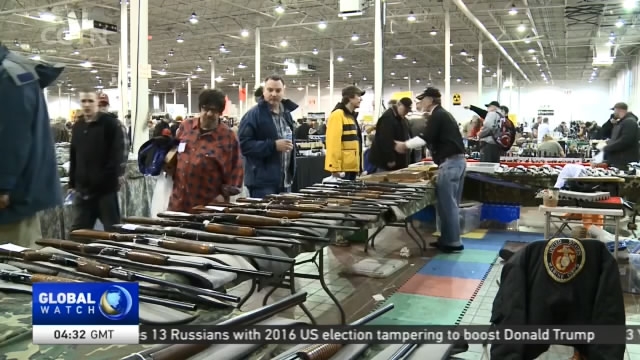
13:19, 17-Feb-2018
Gun Control Effectiveness: Restrictions in UK, Japan and Australia have sharply reduced shootings

In the aftermath of the Florida shooting, there are renewed calls to fix US gun control laws. Strict laws in other countries are working and preventing needless deaths. The politically-charged debate over gun control in the United States has yielded few results in the recent years. But as CGTN's Jim Spellman reports, advocates say it doesn't have to be that way.
The United States is awash in guns. A 2017 Pew research Center study finds that about 4 in 10 US adults live in a household with a gun. Most of those households report having more than one gun.
ENRIQUE S. PUMAR, ASSOCIATE PROFESSOR THE CATHOLIC UNIVERSITY OF AMERICA "There is a correlation between the availability of guns and the number of mass shootings. Both of them have been going up at the same time and it's not coincidental."
Other countries have taken strict gun control measures and seen positive results.
A mass shooting in Australia in 1996 led to many guns being banned. The government bought back and destroyed hundreds of thousands of weapons. In the years before the crackdown, there were thirteen mass shootings in Australia. In the 2 decades since the ban there have been no mass shootings.
A 1996 mass shooting in the UK led to laws banning handguns, with only a few exceptions. Within a few years gun deaths plummeted and have continued to fall since the early 2000s.
Japan has some of the most restrictive gun control laws in the world. According to the Council of Foreign Relations the gun homicide rate is lowest in the world- just one in 10 million.
But there is huge political resistance to gun control in the US. The powerful NRA gun lobby opposes nearly every gun control measure and guns are extremely popular in much of the country.
Shawn VanDiver is a public safety researcher at the Truman National Security Project.
SHAWN VANDIVER, RESEARCHER TRUMAN NATIONAL SECURITY PROJECT "We're never going to get to a solution like Australia has, we're never going to get to a solution like the UK has had. We're American and in our constitution the second amendment guarantees the right to bear arms. So I think we've got to operate within those bounds but I think there are some things we can do tomorrow that would have a drastic effect."
VanDiver suggests limiting ammunition capacity, universal background checks and requiring firearms safety training could help, even if those measures wouldn't stop mass shootings completely.
SHAWN VANDIVER TRUMAN NATIONAL SECURITY PROJECT "Isn't it worth trying something? Arent the 17 dead kids worth doing something? Aren't the 20 something dead kids in Sandy Hook worth doing something? Anything?"
JIM SPELLMAN WASHINGTON DC "Assault weapons were banned in the US from 1994 to 2004. According to a researcher at the University of Massachusetts mass shootings fell during the ban and have jumped dramatically since, but there is little chance a new ban could pass in the current US political climate. Jim Spellman, CGTN, Washington."

SITEMAP
Copyright © 2018 CGTN. Beijing ICP prepared NO.16065310-3
Copyright © 2018 CGTN. Beijing ICP prepared NO.16065310-3